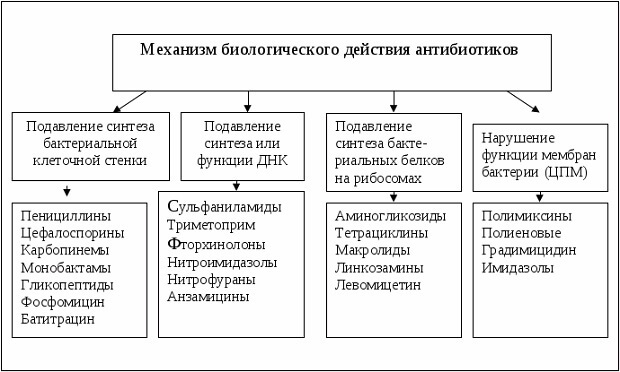Can I take antibiotics and antiviral drugs at the same time?
 Antibiotics are prescribed to suppress the growth of bacterial microflora, and antiviral - to combat non-cellular forms of life, i.e. viruses.These two large groups of drugs have completely different indications.Both those and others should be taken only on the prescription of the doctor after a survey is conducted to determine the pathogen.Antiviral drugs are completely ineffective in bacterial infections, and antibiotics - in viral diseases.
Antibiotics are prescribed to suppress the growth of bacterial microflora, and antiviral - to combat non-cellular forms of life, i.e. viruses.These two large groups of drugs have completely different indications.Both those and others should be taken only on the prescription of the doctor after a survey is conducted to determine the pathogen.Antiviral drugs are completely ineffective in bacterial infections, and antibiotics - in viral diseases.
Antibiotics and antiviral agents: indications for
The action of antibiotics is directed either at suppressionPropagation of pathogenic microflora, or to destroy it with subsequent excretion from the patient's body.The choice of the drug is determined by the type of infectious agent.Many antibacterial agents are characterized by a wide range of action, i.e., activity against many species of bacteria.To combat microbes, use natural or semi-synthetic agents.There is also a separate group of synthetic drugs - antibacterial chemotherapy.

Antiviral agents are active only for different types of viral particles.Some drugs of this category block the process of virus multiplication at different stages( contain exogenous interferon), others - stimulate the biosynthesis of its own interferon in the body.
Recommended to read:When to take antibiotics, and when - antiviral
Indications for the prescription of antibiotics are bacterial infections:
-
 inflammation of the tonsils( sore throat);
inflammation of the tonsils( sore throat); - respiratory infection( bronchitis, pneumonia);
- inflammation of the renal pelvis( pyelonephritis);
- inflammation of the mucous membranes of the bladder( cystitis);
- gastritis and gastric ulcer( lesions caused by bacteria of the genus Helicobacter);
- infectious colitis and enteritis;
- tuberculosis.
Important: antibacterial drugs may be prescribed for prophylactic purposes in order to prevent the activation of the opportunistic microflora of the skin and mucous membranes.Antibiotics can reduce the risk of postoperative complications and the spread of nosocomial infections to zero.
Some antiviral drugs should be taken for preventive and therapeutic purposes during the seasonal peak of the incidence of ARVI. They are prescribed for the development of the following diseases:
- ARVI( including influenza);
- cytomegalovirus infection;
- herpetic lesions;
- pathologies caused by the human papillomavirus;
- HIV infection.
Important: for respiratory viral infections are effective Arbidol and Remantadine.Acyclovir is active against herpes simplex virus.To cope with the papilloma virus, Lavomax is prescribed, and for cytomegalovirus infection Levamisol is indicated.
Should I take antiviral drugs and antibiotics at the same time?
Since antibiotics and antiviral agents act on completely different types of pathogens, it is first necessary to establish the nature of the disease.This is the prerogative of the attending physician.If symptoms of the disease appear, you should contact a local therapist who will conduct an examination, collect anamnesis and prescribe additional examinations( including laboratory tests).Self-diagnosis and self-treatment, as a rule, harm the body or( at best) is useless.
 Note: has indications that distinguish influenza and other "seasonal" SARS from the common cold of bacterial origin.In acute respiratory infections, symptoms such as body aches, a significant fever and a pronounced general malaise appear in the first place.Respiratory symptoms usually join only 2-3 days.If there is a catarrhal disease caused by the reproduction of the opportunistic microflora, then at first there are nasal congestion, sore throat and cough, and only after a while - hyperthermia, chills and general malaise.
Note: has indications that distinguish influenza and other "seasonal" SARS from the common cold of bacterial origin.In acute respiratory infections, symptoms such as body aches, a significant fever and a pronounced general malaise appear in the first place.Respiratory symptoms usually join only 2-3 days.If there is a catarrhal disease caused by the reproduction of the opportunistic microflora, then at first there are nasal congestion, sore throat and cough, and only after a while - hyperthermia, chills and general malaise.
Parallel use of antibiotics and antiviral drugs is justified if there is a so-called "superinfection".It represents the attachment of secondary bacterial infection against the background of a weakening of the immunity caused by a viral disease.In particular, bacterial pneumonia is one of the most dangerous complications of respiratory viral infections.If you do not start adequate antibiotic therapy in a timely manner, pneumonia can end in a fatal outcome.
At the same time, it is possible and necessary to take antiviral drugs and antibiotics for diseases that develop in an HIV-infected person.It is widely known that the cause of death of patients with this diagnosis is not the immunodeficiency virus itself, but the so-called.Opportunistic infections.
Important: for the fight against the immunodeficiency virus developed drugs such as lamivudine and Zalcitabine.Complete recovery is not yet possible, but the regular use of pharmacological agents significantly prolongs the patient's life and prevents HIV infection from becoming AIDS.
 The question of the expediency of the joint use of drugs of two different groups is decided by the doctor.Self-identification of superinfection is impossible.When appointing drugs, the nature and dynamics of the disease, the general condition and individual characteristics of the patient, as well as the presence of contraindications to the appointment of certain pharmacological agents are taken into account.It is necessary to take into account the presence of drug antagonism - a phenomenon in which the effect of one drug is weakened when another is taken or serious side effects develop.
The question of the expediency of the joint use of drugs of two different groups is decided by the doctor.Self-identification of superinfection is impossible.When appointing drugs, the nature and dynamics of the disease, the general condition and individual characteristics of the patient, as well as the presence of contraindications to the appointment of certain pharmacological agents are taken into account.It is necessary to take into account the presence of drug antagonism - a phenomenon in which the effect of one drug is weakened when another is taken or serious side effects develop.
If the local therapist diagnoses "SARS" or "flu", and recommends taking antibiotics and antiviral drugs simultaneously, then it may be about the incompetence of the doctor or his material interest( drug manufacturers often "stimulate" specialists).The intake of antibiotics can somewhat reduce your own immunity, because along with pathogenic bacteria, sometimes the normal microflora of the intestine also perishes.As a consequence, the balance in the microbiocenosis is disturbed, and a pathological condition known as dysbacteriosis develops.For this reason, it should not be taken with influenza antibacterial drugs "just in case".
Vladimir Plisov, medical reviewer



